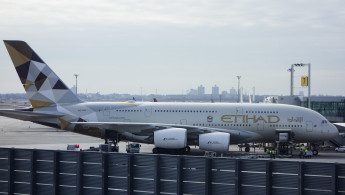UAE ministers in Israel to sign mutual visa waver agreement during first official visit
A UAE delegation has arrived in Israel for a high-profile visit.
3 min read
An Etihad flight took the Emirati delegation to Israel on Tuesday [Getty-file photo]
A UAE government delegation arrived in Israel on Tuesday in the first official visit to the country, as the two countries look to further bolster ties with the signing of a visa waver agreement.
The Etihad flight took off from Abu Dhabi on Tuesday morning before touching down at Tel Aviv's Ben-Gurion Airport, which comes two months after the two countries first announced they would normalise relations.
Led by Economy Minister Abdullah bin Touq Al-Mari, the UAE delegation will include Minister of State for Financial Affairs Obaid Humaid Al-Tayer and other leading government officials.
They will be joined by US Treasury Secretary Steven Mnuchin and Middle East envoy Ari Berkowitz, according to Reuters.
The delegation will remain in the airport due to coronavirus restrictions, where they will meet Israeli officials for talks on a number of issues.
It comes on the back of a raft of trade agreements between the two countries with the delegation set to sign a mutual visa exemption agreement, according to the news agency.
The UAE cabinet ratified the normalisation agreement with Israel shortly before the delegation left.
The UAE the first Arab country to sign a visa waver agreement with Israel and means Israeli and Emirati citizens can visit each others countries without needing to be approved in advance.
They will also hold talks on aviation, investment, science and technology.
Israel and the UAE surprised many when they announced a they would normalise ties, with Bahrain also announcing it would establish diplomatic relations.
More Arab countries have been tipped to follow suit, including Sudan.
Prime Minister Benjamin Netanyahu on Monday said on the issue of further normalisation agreements: "we will do this with further nations, strengthen the covenant of moderates."
The normalisation agreements have been widely condemned in the Arab world, although most governments have supported or been quiet on the move.
The first passenger Emirati flight to Israel touched down in the UAE this week.
There has been anger to the visa waiver, which allows Emiratis to visit Israel and occupied East Jerusalem without prior approval while Palestinians face tough travel restrictions even within the West Bank.
"Amazing that Israel offer visa free visits to citizens of UAE yet Jordanians, Egyptians and even Palestinians living under its control need visas and permits that are rarely given," said Daoud Kuttab, a leading Palestinian journalist, on Twitter.
"It gets worse. While allowing Emiratis to visit Israel/occupied E Jerusalem visa-free, Israel bars Palestinian refugees (some now in UAE) & Palestinians living only a short drive away under occupation from visiting these areas that they're from wo very difficult-to-obtain permits," tweeted Omar Shakir Israel and Palestine director at Human Rights Watch.
The Etihad flight took off from Abu Dhabi on Tuesday morning before touching down at Tel Aviv's Ben-Gurion Airport, which comes two months after the two countries first announced they would normalise relations.
Led by Economy Minister Abdullah bin Touq Al-Mari, the UAE delegation will include Minister of State for Financial Affairs Obaid Humaid Al-Tayer and other leading government officials.
They will be joined by US Treasury Secretary Steven Mnuchin and Middle East envoy Ari Berkowitz, according to Reuters.
The delegation will remain in the airport due to coronavirus restrictions, where they will meet Israeli officials for talks on a number of issues.
It comes on the back of a raft of trade agreements between the two countries with the delegation set to sign a mutual visa exemption agreement, according to the news agency.
The UAE cabinet ratified the normalisation agreement with Israel shortly before the delegation left.
The UAE the first Arab country to sign a visa waver agreement with Israel and means Israeli and Emirati citizens can visit each others countries without needing to be approved in advance.
They will also hold talks on aviation, investment, science and technology.
|
|
Israel and the UAE surprised many when they announced a they would normalise ties, with Bahrain also announcing it would establish diplomatic relations.
More Arab countries have been tipped to follow suit, including Sudan.
Prime Minister Benjamin Netanyahu on Monday said on the issue of further normalisation agreements: "we will do this with further nations, strengthen the covenant of moderates."
The normalisation agreements have been widely condemned in the Arab world, although most governments have supported or been quiet on the move.
The first passenger Emirati flight to Israel touched down in the UAE this week.
There has been anger to the visa waiver, which allows Emiratis to visit Israel and occupied East Jerusalem without prior approval while Palestinians face tough travel restrictions even within the West Bank.
"Amazing that Israel offer visa free visits to citizens of UAE yet Jordanians, Egyptians and even Palestinians living under its control need visas and permits that are rarely given," said Daoud Kuttab, a leading Palestinian journalist, on Twitter.
"It gets worse. While allowing Emiratis to visit Israel/occupied E Jerusalem visa-free, Israel bars Palestinian refugees (some now in UAE) & Palestinians living only a short drive away under occupation from visiting these areas that they're from wo very difficult-to-obtain permits," tweeted Omar Shakir Israel and Palestine director at Human Rights Watch.





 Follow the Middle East's top stories in English at The New Arab on Google News
Follow the Middle East's top stories in English at The New Arab on Google News
![Both Hamas and the Palestinian Authority welcomed the ICC arrest warrants [Getty]](/sites/default/files/styles/image_330x185/public/2024-11/GettyImages-2178351173.jpg?h=199d8c1f&itok=TV858iVg)

